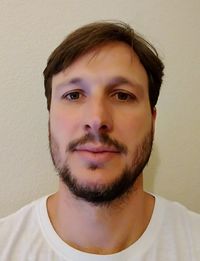CAZypedia celebrates the life of Senior Curator Emeritus Harry Gilbert, a true giant in the field, who passed away in September 2025.
CAZypedia needs your help!
We have many unassigned pages in need of Authors and Responsible Curators. See a page that's out-of-date and just needs a touch-up? - You are also welcome to become a CAZypedian. Here's how.
Scientists at all career stages, including students, are welcome to contribute.
Learn more about CAZypedia's misson here and in this article. Totally new to the CAZy classification? Read this first.
Difference between revisions of "User:Marcelo Liberato"
Harry Brumer (talk | contribs) m |
|||
| Line 1: | Line 1: | ||
| − | [[Image: | + | [[Image:marcelo liberato.jpg|200px|right]] |
Marcelo Liberato is a postdoctoral fellow in the Brazilian Bioethanol Science and Technology Laboratory (CTBE). He obtained his B. Sc. in Biology from the Federal University of São Carlos and his master and PhD were obtained in Biomolecular Physics at University of São Paulo, under the supervision of Prof. Igor Polikarpov. His work is focused on multimodular enzymes, trying to comprehend the influences of accessory modules on catalytic domains. He has determined the crystal structures of | Marcelo Liberato is a postdoctoral fellow in the Brazilian Bioethanol Science and Technology Laboratory (CTBE). He obtained his B. Sc. in Biology from the Federal University of São Carlos and his master and PhD were obtained in Biomolecular Physics at University of São Paulo, under the supervision of Prof. Igor Polikarpov. His work is focused on multimodular enzymes, trying to comprehend the influences of accessory modules on catalytic domains. He has determined the crystal structures of | ||
Latest revision as of 15:45, 19 May 2018
Marcelo Liberato is a postdoctoral fellow in the Brazilian Bioethanol Science and Technology Laboratory (CTBE). He obtained his B. Sc. in Biology from the Federal University of São Carlos and his master and PhD were obtained in Biomolecular Physics at University of São Paulo, under the supervision of Prof. Igor Polikarpov. His work is focused on multimodular enzymes, trying to comprehend the influences of accessory modules on catalytic domains. He has determined the crystal structures of
Glycoside Hydrolases:
Carbohydrate-binding modules:
References
- Liberato MV, Silveira RL, Prates ÉT, de Araujo EA, Pellegrini VO, Camilo CM, Kadowaki MA, Neto Mde O, Popov A, Skaf MS, and Polikarpov I. (2016). Molecular characterization of a family 5 glycoside hydrolase suggests an induced-fit enzymatic mechanism. Sci Rep. 2016;6:23473. DOI:10.1038/srep23473 |
- Prates ÉT, Stankovic I, Silveira RL, Liberato MV, Henrique-Silva F, Pereira N Jr, Polikarpov I, and Skaf MS. (2013). X-ray structure and molecular dynamics simulations of endoglucanase 3 from Trichoderma harzianum: structural organization and substrate recognition by endoglucanases that lack cellulose binding module. PLoS One. 2013;8(3):e59069. DOI:10.1371/journal.pone.0059069 |
- Contesini FJ, Liberato MV, Rubio MV, Calzado F, Zubieta MP, Riaño-Pachón DM, Squina FM, Bracht F, Skaf MS, and Damasio AR. (2017). Structural and functional characterization of a highly secreted α-l-arabinofuranosidase (GH62) from Aspergillus nidulans grown on sugarcane bagasse. Biochim Biophys Acta Proteins Proteom. 2017;1865(12):1758-1769. DOI:10.1016/j.bbapap.2017.09.001 |
- Campos BM, Liberato MV, Alvarez TM, Zanphorlin LM, Ematsu GC, Barud H, Polikarpov I, Ruller R, Gilbert HJ, Zeri AC, and Squina FM. (2016). A Novel Carbohydrate-binding Module from Sugar Cane Soil Metagenome Featuring Unique Structural and Carbohydrate Affinity Properties. J Biol Chem. 2016;291(45):23734-23743. DOI:10.1074/jbc.M116.744383 |
